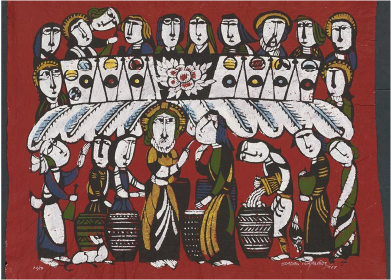“Love is patient; love is kind” (1Cor 13:4). We often hear these words of the Apostle Paul read at weddings. But do they really reflect his and other New Testament writers’ views of marriage and relationships? It’s complicated.
What does Paul say about marriage?
Paul has the most to say about marriage in 1Cor 6:1-7:39, and he focuses not so much on the love between a husband and wife but on the function of marriage to keep individuals away from illicit sexual relationships. He suggests that husbands and wives have equivalent authority over one another: the husband is not hierarchically situated above the wife (1Cor 7:4). He proposes that even within marriage, self-control is paramount. He writes, “it is better to marry than to burn,” a statement that connotes both sexual desire and the apocalyptic end of the world that Paul envisions in the Corinthians’ imminent future (1Cor 7:9).
Paul goes on to give specific advice on whether to become or remain married, depending on the individual’s current situation. The general principle for each person is “Let each of you lead the life that the Lord has assigned” (1Cor 7:17). In other words, stay as you are, in large part because an “impending crisis” (1Cor 7:26), the end of the world, is near. This is not a positive view of marriage. Love, care, children, or economic partnerships are not in sight—only sex and “burning.”
Indeed, Paul’s words about love with which I began, “love is patient; love is kind” (1Cor 13:4), come in the context not of marriage but of communal worship. Paul locates love within the community, the church, the body of Christ, not within marriage.
What does Jesus say about marriage?
In 1Cor 7:10-11, Paul cites a commandment of Jesus, one of the few teachings that aligns with a statement in the gospels that Paul seems to know. In Matt 5:27-32 (and parallels in Mark 10:2-12; Luke 16:18), Jesus addresses two topics related to marriage—adultery and divorce—and intensifies the Jewish law. One should not commit adultery; even thinking about it is a sin. Rather than allowing divorce, which the law did, Jesus argues it is unlawful and places a woman in a position that results in adultery.
Jesus was not married, and the gospels record teachings that downplay the importance of family (Matt 10:34-39; Matt 12:46-50; Mark 3:31-35; Luke 8:19-21; Luke 12:49-53). When asked a question about marriage after resurrection, Jesus argues that his interlocutors have misunderstood the concept: marriage cannot exist after resurrection because the person completely transforms so that marriage, a social reality, makes little sense (Matt 22:23-33; Mark 12:18-27; Luke 20:27-40). Jesus does, however, use imagery of weddings to describe God’s kingdom in parables: bridesmaids wait for the bridegroom (Matt 25:1-13; see also Luke 5:34-35), and the groom’s father chooses his banquet guests (Matt 22:1-14). Anticipation and abundance characterize weddings and the kingdom of God (see also John 2:1-11).
Jesus and Paul, therefore, have fairly negative views of marriage. They make no recommendations for how to create a caring or loving relationship between husband and wife, and they consider marriage a social arrangement necessary for the present moment but negated in the apocalyptic future.
What do other texts say about marriage?
Elsewhere in the New Testament, however, married couples are portrayed positively (e.g., Mary and Joseph in Matt 1 // Luke 1; Priscilla and Aquila in Acts 18:26, Rom 16:3), and positive ideas about marriage emerge in later texts, most notably Eph 5:22-33, a letter seemingly penned by “Paul” but whose authorship is questionable. This author writes, “Husbands, love your wives, just as Christ loved the church” (Eph 5:25). Love is essential, at least in one direction. The author does not view marriage as an egalitarian relationship. Rather, he wants wives to be subject to husbands, thereby creating a hierarchical relationship between husbands and wives, as well as between fathers and children, masters and slaves (see similarly Col 3:18-25; Titus 2:1-10). Still, in these later texts, marriage appears to be the norm and an acceptable part of Christian communal life.





